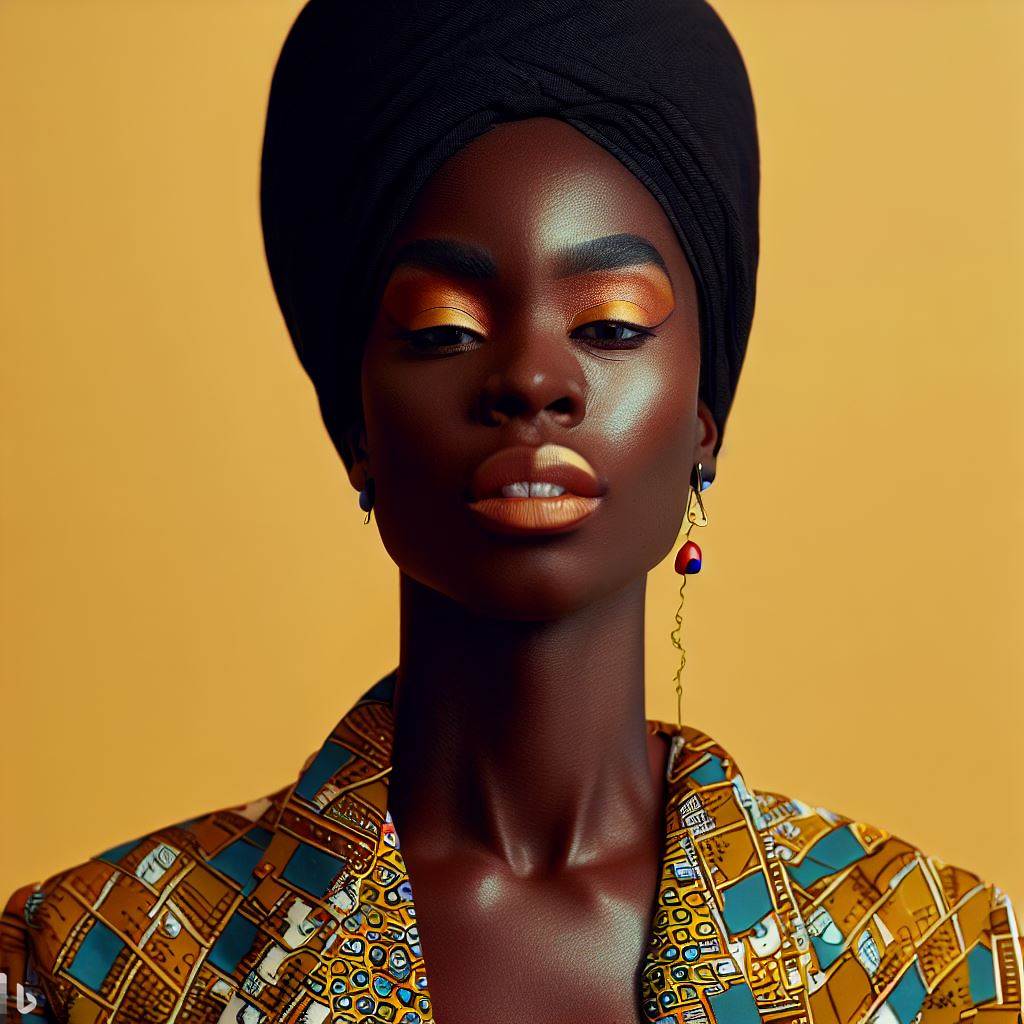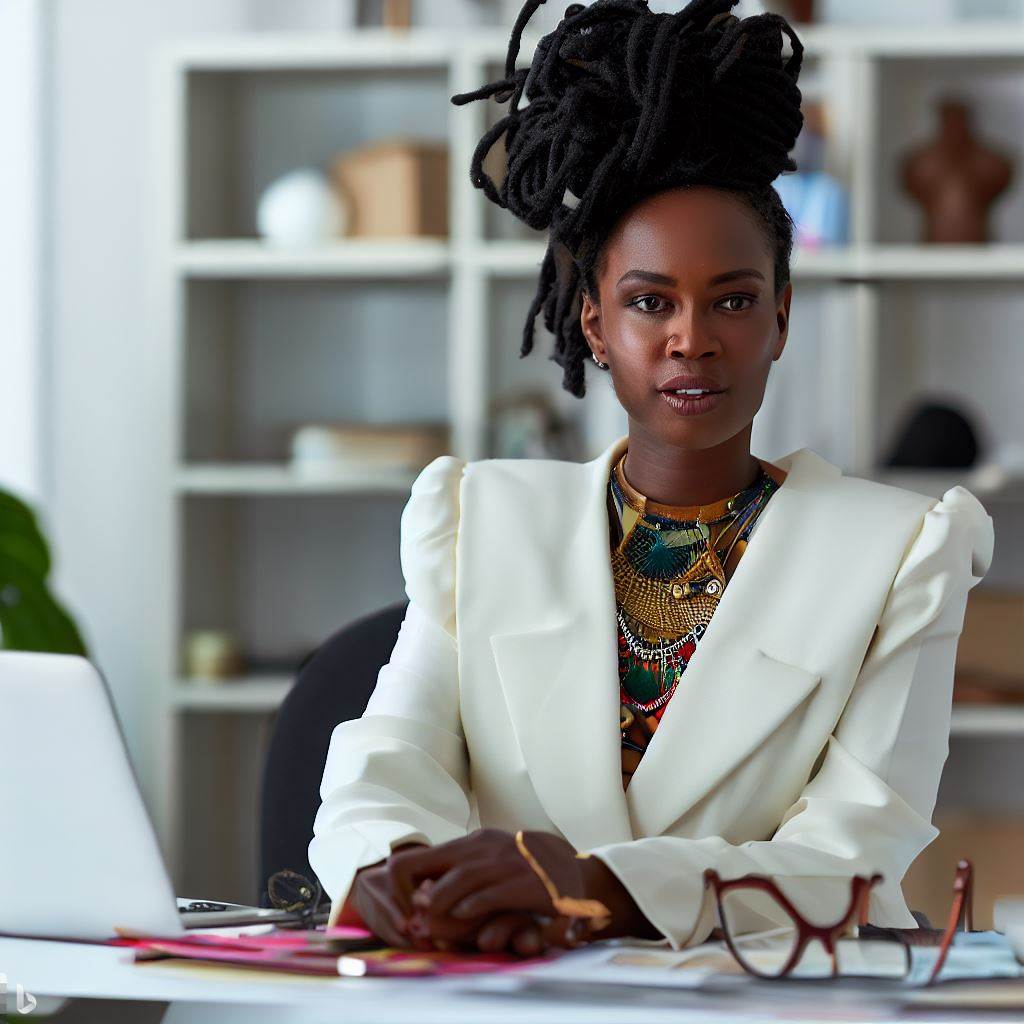Introduction
The Nigerian fashion industry is a vibrant and dynamic sector that is rapidly growing. It is home to an array of talented designers and has gained international recognition.
Highlighting women in Nigerian fashion design is crucial as they play a significant role in shaping the industry.
This blog post will explore the inspiring stories of women who have become leaders and innovators in the Nigerian fashion design industry.
By showcasing their achievements, we can celebrate their contributions and encourage future generations of women in the industry.
Historical Background of Nigerian Fashion Design
When discussing Nigerian fashion design, it is essential to understand its historical background.
The beginnings of Nigerian fashion design can be traced back to indigenous cultures and the creativity of its people.
A. Overview of the beginnings of Nigerian fashion design
- The roots of Nigerian fashion design can be found in the country’s diverse ethnic groups.
- Indigenous communities in Nigeria have a rich tradition of textile weaving and garment making.
- Traditional Nigerian fashion design drew inspiration from local materials such as leather, beads, and woven fabrics.
- Initially, Nigerian clothing aimed to serve functional purposes and reflect cultural identity.
B. Highlights of traditional Nigerian clothing and textiles
- One well-known Nigerian traditional clothing is the agbada, a flowing gown often worn by men.
- Another popular traditional Nigerian garment for women is the wrapper, a colorful and patterned fabric.
- Adire is a tie-and-dye technique used to create unique patterns on fabrics, known for its vibrant colors.
- Aso Oke, a handwoven fabric, is commonly used for ceremonial and formal occasions.
C. Influence of Western fashion on Nigerian designs
- The arrival of European colonialists introduced Western fashion influences to Nigeria.
- Western garments like shirts, trousers, and dresses gradually made their way into Nigerian fashion culture.
- This influence led to the fusion of traditional Nigerian styles with Western fashion elements.
- Today, Nigerian fashion designers skillfully incorporate traditional and modern aesthetics in their designs.
Basically, understanding the historical background of Nigerian fashion design helps us appreciate the fusion of traditional and Western influences that characterize contemporary Nigerian fashion.
By exploring the roots of the industry, we can better understand the creativity and innovation of Nigerian women in fashion design.
Read: The Impact of Technology on Interior Design in Nigeria
Rise of Women in Nigerian Fashion Design
Women have played a significant role in shaping the Nigerian fashion design industry.
Despite facing numerous challenges, they have made invaluable contributions and paved the way for future generations.
A. Contributions made by early women pioneers in the industry
- Grace Ademola, one of the early pioneers, established her own fashion house in the 1950s.
- Stella Obasanjo, former First Lady of Nigeria, was not only a fashion enthusiast but also launched her line.
- Deola Sagoe gained international recognition for her innovative fusion of African and Western aesthetics.
B. Challenges faced by women designers and how they overcame them
- Gender inequality was a major obstacle that women designers had to overcome to gain recognition.
- Limited access to resources such as funding, materials, and education posed challenges to their growth.
- However, through determination and resilience, women designers proved their worth and created success.
C. Examples of successful women designers who paved the way for future generations
- Ituen Basi, known for her vibrant prints and innovative designs, has become a household name in Nigeria.
- Maki Oh, founded by Amaka Osakwe, has gained international acclaim for its unique and contemporary designs.
- Zizi Cardow, a trailblazer in the industry, has consistently pushed boundaries with her exceptional creations.
These successful women designers have not only made a name for themselves but have also inspired and mentored aspiring designers.
They have challenged societal norms and proved that women can excel in the fashion industry.
Furthermore, women designers have contributed to the preservation and promotion of Nigerian culture and heritage through their designs.
They have embraced traditional fabrics, patterns, and techniques, infusing them with modern styles to create distinct fashion statements.
Additionally, these designers have been instrumental in promoting sustainable and ethical fashion practices.
They have championed the use of organic fabrics, fair trade, and ethical production techniques, thus making a positive impact on the environment and local communities.
Despite the progress made, the journey is far from over.
Women designers in Nigeria still face challenges such as limited market access, competition, and societal expectations.
However, they are continually breaking barriers and carving out their place in the industry.
Generally, the rise of women in Nigerian fashion design is a testament to their talent, determination, and creativity.
Through their contributions, they have reshaped and diversified the industry, leaving a lasting impact on the global fashion landscape.
Read: Famous Nigerian Interior Designers: Profiles and Achievements
Current Women Leaders in Nigerian Fashion Design
A. Profiles of Prominent Women Designers in Nigeria
- Folake Coker: Founder of the luxury fashion label Tiffany Amber, Folake Coker is a trailblazer in the Nigerian fashion industry. With her bold and vibrant designs, she has gained international recognition.
- Lisa Folawiyo: Known for her innovative use of traditional West African fabrics, Lisa Folawiyo has created a niche for herself in the fashion world. Her label, Jewel by Lisa, showcases her fusion of traditional and contemporary styles.
- Deola Sagoe: Deola Sagoe is renowned for her exceptional craftsmanship and attention to detail. Her designs often incorporate traditional African textiles and techniques, creating a unique blend of cultural heritage and modern fashion.
- Lanre Da Silva Ajayi: With her eponymous label, Lanre Da Silva Ajayi has become a household name in Nigerian fashion. Her designs exude elegance and sophistication, often featuring intricate embellishments and feminine silhouettes.
B. Discussion of Their Unique Design Aesthetics and Signature Styles
Folake Coker’s designs are known for their luxurious fabrics, impeccable tailoring, and fusion of African and Western influences.
She effortlessly blends traditional elements with contemporary silhouettes, creating timeless pieces.
Lisa Folawiyo’s signature style lies in her ability to transform traditional Ankara fabrics into modern and chic garments.
Her designs showcase intricate beadwork and embellishments, adding a touch of glamour to her creations.
Deola Sagoe’s design aesthetic is characterized by her mastery of using traditional African fabrics in innovative ways.
She combines bold prints with elegant silhouettes, creating garments that are both striking and sophisticated.
Lanre Da Silva Ajayi’s designs are marked by their romantic and vintage-inspired aesthetics.
She often incorporates lace, sequins, and embroidery into her collections, resulting in feminine and glamorous pieces that celebrate the female form.
C. Impact of Their Work on the Nigerian Fashion Scene and Beyond
These women designers have made a significant impact on the Nigerian fashion scene and have gained recognition worldwide.
Their unique design aesthetics and signature styles have put Nigerian fashion on the global map.
Through their innovative designs, they have challenged conventional notions of African fashion, showcasing the rich and diverse cultural heritage of Nigeria.
They have also provided a platform for local artisans and craftsmen, contributing to the economic growth of the country’s fashion industry.
Beyond Nigeria, these women have become ambassadors of African fashion, promoting the continent’s creativity and talent on international runways.
Their work has inspired a new generation of designers, encouraging them to embrace their cultural roots while pushing boundaries in the fashion industry.
Essentially, the current women leaders in Nigerian fashion design have revolutionized the industry with their unique design aesthetics and signature styles.
They have successfully positioned Nigerian fashion on the global stage, showcasing the creativity and talent that Nigeria has to offer.
These women are not just designers, but leaders and innovators, paving the way for the future of Nigerian fashion.
Read: The Role of Culture in Nigerian Interior Design: An Exploration
Innovations and Trends in Nigerian Fashion Design
A. Women designers in Nigerian fashion have brought fresh perspectives and ideas to the industry
Nigerian fashion design has seen a surge of innovative ideas and trends in recent years, largely driven by the creativity and skill of women designers in the industry.
These designers have brought fresh perspectives and ideas, pushing boundaries and redefining Nigerian fashion.
B. They have explored unique techniques, fabric choices, and design approaches
One of the ways in which women designers have contributed to the industry is through their exploration of unique techniques.
They have experimented with various sewing and embellishment techniques, creating visually stunning and intricate designs.
From hand-embroidered details to the use of traditional weaving techniques, these women have elevated and modernized Nigerian fashion.
In addition to techniques, women designers have also made bold choices in fabric selection.
They have looked beyond the conventional materials typically used in Nigerian fashion and incorporated unconventional fabrics like leather, silk, and even recycled materials.
This innovative approach has not only given their designs a unique edge but has also contributed to sustainability and eco-friendly practices in the industry.
Moreover, women designers in Nigerian fashion have showcased their creativity through their design approaches.
They have embraced unconventional silhouettes, mixing and matching different styles to create fresh and exciting looks.
Their designs often blend traditional Nigerian elements with contemporary influences, resulting in a harmonious fusion that captivates both local and international audiences.
C. Their innovative designs have gained international recognition
The innovative designs created by women designers in Nigerian fashion have gained international recognition.
Their work has been featured in prestigious fashion weeks and exhibitions across the globe, bringing Nigerian fashion to the forefront of the international stage.
The use of vibrant colors, bold prints, and intricate details has set Nigerian fashion apart, making it a significant player in the global fashion industry.
One particular example of an innovative design that gained international recognition is a dress created by renowned Nigerian designer, Lisa Folawiyo.
This dress showcased her unique approach to combining traditional African prints with modern design elements.
The use of vibrant colors and the incorporation of hand-embellished details made it an instant hit both locally and internationally.
In general, women designers in Nigerian fashion have revolutionized the industry through their fresh perspectives, unique techniques, and innovative design approaches.
Their work has gained international recognition, putting Nigerian fashion on the global map. With their continuous creativity and drive, the future of Nigerian fashion looks bright and full of exciting innovations.
Read: Challenges and Opportunities in Nigeria’s Interior Design Field

Empowering Women in the Nigerian Fashion Industry
In recent years, the Nigerian fashion industry has witnessed a significant increase in the number of women designers, leaders, and innovators.
This surge can be attributed to various initiatives and organizations that have emerged to support and uplift women in fashion design.
A. Examination of Initiatives and Organizations Supporting Women in Fashion Design
One such initiative is the Fashion Designers Association of Nigeria (FADAN). FADAN provides a platform for female designers to showcase their talent, network, and access funds for their businesses.
The organization also offers training programs and workshops to enhance the skills of aspiring women designers.
Another organization making an impact is the Nigerian Women in Fashion Foundation (NWIFF).
NWIFF aims to create an enabling environment for women in the fashion industry by providing financial support, mentorship, and networking opportunities.
This foundation has been instrumental in empowering women designers to establish and grow their businesses successfully.
Furthermore, the Nigerian government has recognized the potential of the fashion industry in driving economic growth.
In 2013, the Bank of Industry launched the Fashion Fund Initiative, a program aimed at providing affordable loans and grants to fashion entrepreneurs, with a focus on supporting women-led businesses.
This initiative has been vital in promoting inclusivity and enabling women designers to thrive.
B. Importance of Mentorship and Networking Opportunities for Aspiring Women Designers
Mentorship and networking opportunities play a crucial role in the success of women in the Nigerian fashion industry.
Aspiring designers can greatly benefit from the guidance and advice of experienced professionals.
Mentorship programs, such as those offered by FADAN and NWIFF, connect upcoming designers with established industry leaders, allowing them to learn from their experiences and gain valuable insights into the business.
Networking events and platforms also provide women designers with exposure and the chance to build strategic alliances.
Fashion shows, exhibitions, and fashion weeks create opportunities for designers to showcase their work and connect with potential clients, investors, and collaborators.
These networking avenues are particularly important for women, as they often face barriers and biases that can hinder their progress.
C. Role Models and Success Stories Inspiring the Next Generation of Women in Nigerian Fashion
The success stories of women leaders and innovators in the Nigerian fashion industry serve as inspiration for the next generation of female designers.
By breaking barriers and achieving remarkable milestones, these role models showcase the potential and possibilities within the industry.
Lisa Folawiyo, renowned for her eponymous brand, Lisa Folawiyo Studio, is a prime example.
Her unique blending of traditional Ankara fabrics with contemporary designs has gained international acclaim.
Her success story serves as a testament to the talent and creativity of Nigerian women designers.
Another inspiring figure is Deola Sagoe, a trailblazer in the Nigerian fashion industry.
Her brand, House of Deola, has become synonymous with African luxury fashion.
Through her work, Sagoe has paved the way for aspiring women designers and has been a strong advocate for empowering women in the industry.
In essence, empowering women in the Nigerian fashion industry is crucial for the growth and development of the sector.
Initiatives and organizations supporting women, mentorship programs, networking opportunities, and the presence of strong role models are all factors that contribute to the success of women designers.
Publish Your Professional Profile, Business or Brand
Showcase your expertise, gain trust, and boost visibility instantly on Professions.ng.
Publish NowBy investing in these areas, the industry can create a more inclusive and thriving environment for women in fashion design.
Recognition and Achievements of Nigerian Women Designers
A. Awards, accolades, and achievements of women in Nigerian fashion design
- Genevieve Nnaji: Named one of the 100 most influential people in the world by TIME magazine.
- Deola Sagoe: Received the Fashion Business and Leadership Excellence Award by the African Fashion Foundation.
- Lisa Folawiyo: Won the African Fashion Designer of the Year award at the Glitz Africa Fashion Week.
- Ituen Basi: Recognized as the Most Innovative Designer at the Nigeria Fashion and Style Awards.
- Maki Oh: Received the Rising Star of the Year award at the Africa Fashion Awards.
- Tiffany Amber: Honored with the Lifetime Achievement Award by the Exquisite Lady of the Year Awards.
- Zizi Cardow: Won the African Designer of the Year award at the Mode Men Fashion Awards.
- Amaka Osakwe: Received the Future Award Africa for Fashion in recognition of her outstanding contribution.
- Bridget Awosika: Named the Female Designer of the Year at the Lagos Fashion and Design Week.
- Maxine Okwu: Received the Designer of the Year award at the Nigerian Fashion Week.
B. Acknowledgement of their contributions to the global fashion landscape
These Nigerian women designers have not only made a significant impact in Nigeria but have also gained international recognition.
Their talent, creativity, and unique designs have caught the attention of fashion enthusiasts worldwide, placing Nigerian fashion on the global map.
C. Celebration of their impact on Nigerian culture and heritage
The achievements of these women designers go beyond awards and accolades.
They have played a crucial role in preserving and showcasing Nigerian culture and heritage through their designs.
From incorporating traditional fabrics and motifs to promoting indigenous craftsmanship, they have helped bring Nigerian culture to the forefront of the fashion industry.
D. Inspiring the next generation of Nigerian designers
By achieving recognition and success, these women designers have become influential figures in the Nigerian fashion industry.
Their accomplishments inspire aspiring designers to pursue their dreams and make their mark in the world of fashion.
They serve as a testament to the talent and potential that exists within Nigeria’s fashion community.
E. Opening doors for more opportunities
The recognition and achievements of these women designers have also opened doors for more opportunities for Nigerian fashion as a whole.
Their success has attracted international collaborations, partnerships, and investments, leading to the growth and expansion of the Nigerian fashion industry.
They have paved the way for future generations to elevate Nigerian fashion on a global scale.
Conclusion
Our exploration of women in Nigerian fashion design, it is essential to reiterate their significant contributions.
Women have played a pivotal role in shaping the industry, pushing boundaries, and setting trends.
Recognizing and supporting women leaders and innovators in Nigerian fashion design is crucial.
Their unique perspectives and creativity have brought diversity and inclusivity to an industry that was once predominantly male-dominated.
It is now more important than ever to continue promoting inclusion and diversity in fashion design in Nigeria.
By highlighting the work of women designers, we can inspire future generations and break down barriers that limit opportunities for women in the industry.
Whether it’s through mentorship programs, scholarships, or creating spaces for collaboration, supporting women in Nigerian fashion design will ensure a thriving and inclusive industry.
Let us all embrace the talent and innovation of women in Nigerian fashion design.
Together, we can foster an environment that celebrates diversity and empowers women to lead and innovate in the industry.




